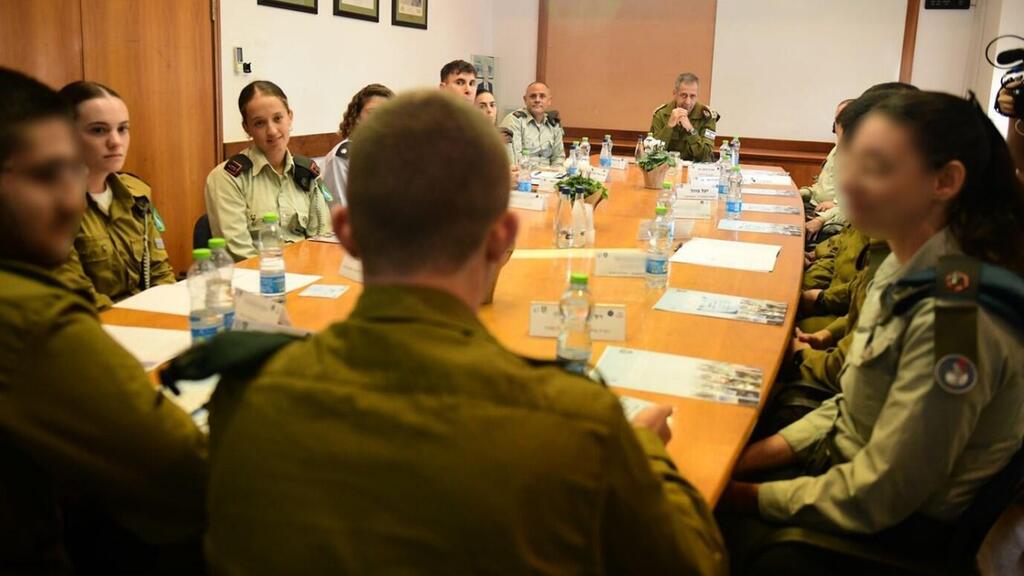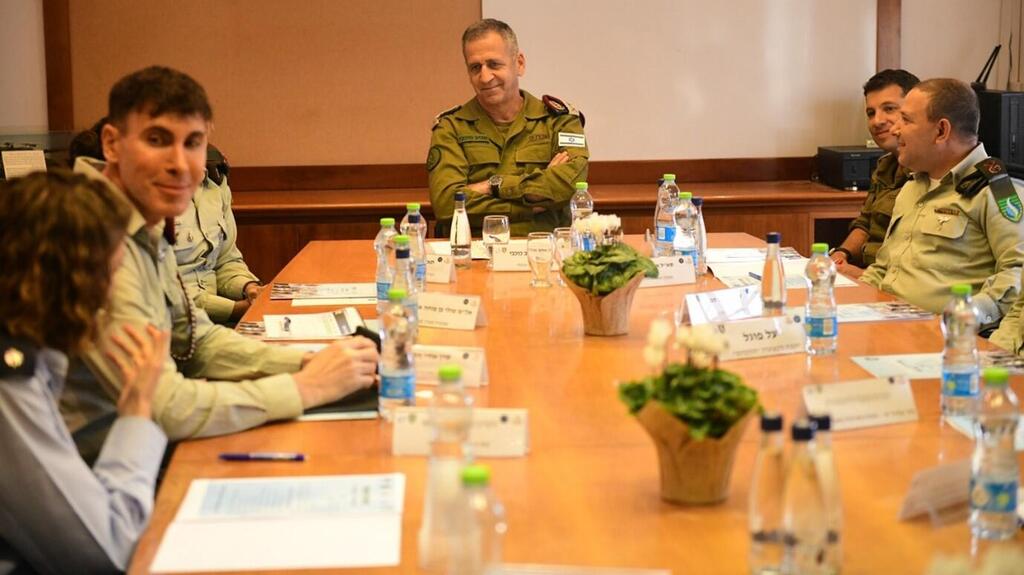Security Officer S. graduated basic training with distinction and serves in a tech position in Unit 81. But there were times at school when he’d walk around facing the walls, struggling to find a good reason to socially interact.
Corporal N. serves in Unit 8200, but as a child was classified as violent and needed a broad variety of treatment and special frameworks, but then in seventh grade he began thriving in science class. Despite his parents’ reservations, he volunteered with “Krembo Wings”, a youth movement inclusive of youth with special needs. Corporal. N. graduated the IDF programming course with distinction, but as a child couldn’t understand how to throw things into the trash, and didn’t know what to do when he was hungry.
Udi Heller
(Video: IDF Spokesperson's Unit)
The youngest of the group, Private S. denied being on the autistic spectrum for most of her life and was so ashamed of the diagnoses that she swore her single mother to secrecy. Now, after a grueling six weeks of basic training, she’s proud of herself and is set to be the first autistic participant in the IDF’s medic’s training course. Despite her strangeness and the challenges, she’s faced, her mother now is no doubt: “I believe in her. She’s a winner.”
I knew he was asked to come, but nothing was certain. They didn’t even want to put his name on the invitation. In the beginning of October, I was a bit pushy and wrote to him: “I, and the other 35,000 autistic students in the education system and our families, would be happy if you would be a guest of honor at the event. It would serve as a valuable message to the General Staff and to all IDF soldiers.” We were on tenterhooks for a few days and the program kept changing. On my way to Latrun, I received from Private S. a picture from the conference room. All four soldiers were sitting beside their commanding officers. Everyone was nervous and excited. Then he entered the room.
Corporal N. is young, captivating and unstoppable, mature and full of words just waiting to get out. He told the Chief of Staff across the table: “I feel that the very fact that I chose to enlist for the IDF sends out a clear social message – I’m just like everyone else. The IDF needs me just like it needs any 18-year-old civilian. Maybe more. I’ve been given a wonderful opportunity and I’ve completely taken it on. I see myself becoming an officer and even signing on as a career soldier.”
N., 20, received his diagnosis at the age of 16 months when he hadn’t spoken a single word. In a video he sent me, N. is addressing an audience, talking about Israel’s Center for Therapeutic Intervention and kindergartens specializing in developing communication skills for autistic children. Then comes the big surprise: With the mentorship of “Shibolim”, an organization devoted to young people with disabilities, he’s in a pre-army academy.
2 View gallery


Members of Titkadmu - national program for the advancement of autistic people in the IDF - meet chief of staff
(Photo: The IDF Spokesperson's Unit)
N. owes his success to “one amazing teacher” who believed in him and found a spot for him in a class for gifted children where he completed 5-point high school matriculation in Computer Science. During high school, in addition to being in two youth groups, the “Agricultural Union” and “Krembo Wings”, he also became an active Beatbox artist. “I’ve taken a long journey to get to where I am today.” He wants his message to be heard “The IDF has benefited from this. So have I. Multiply that by the number of people on the spectrum.”
“Everyone who knows us knows that we’re graduates of the program and that we’re great at achieving our goals. We can be part of the very cornerstone of Israeli society and serve like everyone else” said Corporal S. to hundreds of attendants at the basic training graduation ceremony. He adds that he hasn’t forgotten the trauma of initially being exempted from military service, putting an end to his dreams of serving in the General Staff Reconnaissance Unit (Sayeret Matkal).
I’m sure you’re saying to yourselves “Sure, sure. We get it. It’s a Cinderella story.” But hold off with impatient Israeli cynicism and even with the tolerance. On Facebook all you have to do is “like” something. When Corporal S. came to address hundreds of teenagers and their parents at a conference in Jerusalem, Captain Shay Ilam wrote that she had served as his company commander during basic training and had selected him as the most distinguished course graduate. “As well as being a clever and professional soldier, he was socially very dominant. Throughout the training period, if a volunteer was needed, he’d always be the first to step forward. He was attentive. He looked left and right. He always checked to see who needed help and how he could support others.”
But, his life didn’t start out that way. He displayed violent tendencies at school where he “needed constant oversight to ensure his general behavior.”
His personal file reads: “Doesn’t listen to the bell. Doesn’t listen to the teachers. Is generally unresponsive to, and doesn’t initiate, social interaction. Struggles to see himself as part of the group.”
I met S. in June 2021. He approached the head of the IDF’s psychiatric branch, explaining that he’d run all the way from the pre-army academy in South Tel Aviv just to say how much enlisting meant to him. “Despite where I am, I’m ashamed to admit that I’m diagnosed as autistic and that I haven’t always been able to cope on my own.” I appeared with him a few months later on the stage at Latrun at the swearing in ceremony of 97 autistic new recruits, each receiving their weapons shouting out their oaths. With them were hundreds of parents and soldiers from the three previous intakes.
S. has come a long way since the first intake and I knew that he was the person who should speak on behalf of everyone. S. concluded his address saying: “I hope that in time, more and more doors like this will open up. You’ll soon see graduates of this program at ceremonies allocating officers their ranks and one day, some of us will lead the units that have opened their doors to us.”
We’re glad to see the three first soldiers with autism embarking on an officer’s training course - and they won’t be the last. There are lots of soldiers on the spectrum with regular enlistment profiles eagerly awaiting these opportunities. Their commanding officers’ praises at the meeting with the chief of staff leaves no room for doubt regarding their capabilities.
You can’t but be filled with pride when S.’s commanding officer describes him as “a star that just wants to be part of the whole project and mission dedicated to the security of the State of Israel” and his “compulsion to be the very best – to prove to everyone what he’s worth and what he can do – to every day be the best version of himself, to excel, lead and impact.”
2 View gallery


Members of Titkadmu - national program for the advancement of autistic people in the IDF - meet chief of staff
(Photo: The IDF Spokesperson's Unit)
A. completed the IDF’s Cyber Defense Academy school’s prestigious programming course. His commanding officer spares no praise describing how “we received an exceptionally talented soldier with outstanding abilities, a phenomenal capacity for learning, fast comprehension and enormous talent. We’re very glad that S. came to us and we’ll continue nurturing and cultivating him within the unit.”
Major. S is a hardened combat navigator – the kind that Alice Miller always dreamt of becoming. It hasn’t always been easy for us over the past year. But, I can only commend her decision to retrain for the IDF’s Education and Youth Corps and become the commander of the preparatory program for service that trains special sectors of the population.
She managed the meeting with the chief of staff firmly and when she asked him to sum up the meeting, she was surprised when he declined to speak. “I’m here to listen to them.”
He looked left and right to see if anyone else wanted to speak, and then pointed at me. “Udi. Talk.” I then thought to myself: What a legend. With this gesture, he summed up everything I wanted and everything Corporal N. had described – that we should be seen and heard. “This integration allows the rest of my soldiers to deal with challenges and social situations that may confront them in the future. Unlike others, they’ll be able to accept it without hurting the person in front of them without making them feel different” wrote N.’s commanding officer to Kochavi. What a legend!
The writer is Captain Ehud Heller who is autistic and initiated “Titkadmu,” the national program for the advancement of autistic people in the IDF. He holds a Bachelor’s degree in Computer Science and is a trainee in Unit 8200’s Lehavot program that trains for technological entrepreneurship in social fields.



